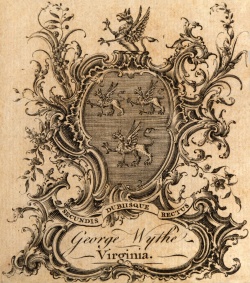Difference between revisions of "Code de l'Humanité"
| Line 20: | Line 20: | ||
}} | }} | ||
<br />Yverdon: Impr. de m. de Felice, 1778<br /> | <br />Yverdon: Impr. de m. de Felice, 1778<br /> | ||
| + | |||
| + | [http://en.wikipedia.org/wiki/Fortunato_Felice Fortuné-Barthélemy de Félice] (August 24, 1723 – February 13, 1789), also known as Fortunato de Felice, was an Italian nobleman, a famed author, philosopher, mathematician, and physicist. <ref> Clorinda Donato, ed., ''The Letters of Fortunato Bartolomeo De Felice to Pietro Verri''. (Johns Hopkins University Press, 1992). </ref> He was the second [http://en.wikipedia.org/wiki/Count_Panzutti Conte di Panzutti], after inheriting the title from his father, Giuseppe Felipe Augusto di Panzutti. 2 de Félice was born in Rome, the oldest of six children. He was confirmed in 1733 in the parish of St. Celso e Giuliano. He studied at Rome and Naples under the Jesuits, taught by Fortunato da Brescia. 3 On May 28, 1746 he was ordained by papal dispensation. 2 Through his studies at the monastery of San Francesco in Ripa, he discovered a love of physics. There he became friends with Celestino Galiani. Later Galiani appointed de Félice chair of Physics, Mathematics, and Ancient and Modern Geography at Naples University. 1 There he befriended [http://en.wikipedia.org/wiki/Raimondo_di_Sangro Prince Raimondo di Sangro], who aided him in his translation of the physicist [http://en.wikipedia.org/wiki/John_Arbuthnot John Arbuthnot's] works from Latin. 5 After rescuing the imprisoned Countess Panzutti, Felice fled to Bern, became a Protestant, and established a famous press at Yverdon-les-Bains, Switzerland, in 1762. 4 He died in Yverdon-les-Bains. | ||
| + | |||
| + | De Felice published Code de l’humanité, ou La législation universelle, naturelle, civile et politique, avec l’histoire littéraire des plus grands hommes qui ont contribuéa la perfection de ce code in 1778, from his press at Yverdon. 6 It is intended to be a compilation of works detailing the universal rights of men. | ||
| + | |||
| + | |||
| + | 2. "Genealogy and History of the De Felice Family and Its Relations." Genealogy and History of the De Felice Family and Its Relations. De-felice.org, n.d. 12 Dec. 2013 | ||
| + | 3. Baldini, Ugo. "Fortunato Da Brescia." Treccani, L'Enciclopedia Italiana. 1997. | ||
| + | 4. Donato, Clornida. "Rewriting Heresy in the Encyclopedie D'Yverdon." Cromohs. 2002 | ||
| + | 5. Miniero, Filomena Anna Maria. "Città Del Monte." Città Del Monte. 12 Oct. 2008. | ||
| + | 6. Félice, Fortuné-Barthélemy De. Code De L'humanité, Ou La Législation Universelle, Naturelle, Civile Et Politique, Avec L'histoire Littéraire Des plus Grands Hommes Qui Ont Contribué a La Perfection De Ce Code. Yverdon: Impr. De M. De Felice, 1778. | ||
| + | |||
==References== | ==References== | ||
| + | <references/> | ||
==External Links== | ==External Links== | ||
Revision as of 13:34, 5 March 2015
Code de l'Humanité, ou La Législation Universelle, Naturelle, Civile et Politique, avec l'Histoire Littéraire des plus Grands Hommes qui ont Contribué a la Perfection de ce Code.
Knightley D'Anvers
| Code de l'Humanite | ||
|
at the College of William & Mary. |
||
| Author | Knightley D'Anvers | |
| Published | Yverdon: de Felice | |
| Date | 1778 | |
Yverdon: Impr. de m. de Felice, 1778
Fortuné-Barthélemy de Félice (August 24, 1723 – February 13, 1789), also known as Fortunato de Felice, was an Italian nobleman, a famed author, philosopher, mathematician, and physicist. [1] He was the second Conte di Panzutti, after inheriting the title from his father, Giuseppe Felipe Augusto di Panzutti. 2 de Félice was born in Rome, the oldest of six children. He was confirmed in 1733 in the parish of St. Celso e Giuliano. He studied at Rome and Naples under the Jesuits, taught by Fortunato da Brescia. 3 On May 28, 1746 he was ordained by papal dispensation. 2 Through his studies at the monastery of San Francesco in Ripa, he discovered a love of physics. There he became friends with Celestino Galiani. Later Galiani appointed de Félice chair of Physics, Mathematics, and Ancient and Modern Geography at Naples University. 1 There he befriended Prince Raimondo di Sangro, who aided him in his translation of the physicist John Arbuthnot's works from Latin. 5 After rescuing the imprisoned Countess Panzutti, Felice fled to Bern, became a Protestant, and established a famous press at Yverdon-les-Bains, Switzerland, in 1762. 4 He died in Yverdon-les-Bains.
De Felice published Code de l’humanité, ou La législation universelle, naturelle, civile et politique, avec l’histoire littéraire des plus grands hommes qui ont contribuéa la perfection de ce code in 1778, from his press at Yverdon. 6 It is intended to be a compilation of works detailing the universal rights of men.
2. "Genealogy and History of the De Felice Family and Its Relations." Genealogy and History of the De Felice Family and Its Relations. De-felice.org, n.d. 12 Dec. 2013
3. Baldini, Ugo. "Fortunato Da Brescia." Treccani, L'Enciclopedia Italiana. 1997.
4. Donato, Clornida. "Rewriting Heresy in the Encyclopedie D'Yverdon." Cromohs. 2002
5. Miniero, Filomena Anna Maria. "Città Del Monte." Città Del Monte. 12 Oct. 2008.
6. Félice, Fortuné-Barthélemy De. Code De L'humanité, Ou La Législation Universelle, Naturelle, Civile Et Politique, Avec L'histoire Littéraire Des plus Grands Hommes Qui Ont Contribué a La Perfection De Ce Code. Yverdon: Impr. De M. De Felice, 1778.
References
- ↑ Clorinda Donato, ed., The Letters of Fortunato Bartolomeo De Felice to Pietro Verri. (Johns Hopkins University Press, 1992).
